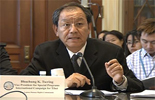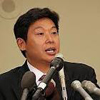XI JINPING'S TIBET CHALLENGE: ONE YEAR ON - Quotes

Alison Reynolds,
Executive Director, International Tibet Network:
"The first year of Xi Jinping's first year has been marked by the stepping up of hardline Tibet policies, as well as tightening restrictions in other areas, including access to the internet. It's one thing to allow a new leader time to consolidate his or her position, but the international community cannot overlook it when the situation gets worse. Ironic considering Xi's first anniversary in power coincides with China's Universal Periodic Review, and its re-election to the United Nations Human Rights Council."

Bhuchung K Tsering,
Interim President, Int'l Campaign for Tibet:
"The new leadership under Xi Jinping has shown that they have the capability of making changes on issues affecting the society, from corruption to promotion of official austerity. However, on the issue of Tibet we are yet to see any indications of their willingness to treat Tibetans in a just manner, even as equal members of the society. Tibet is a litmus test on China's readiness to take a responsible position in the international community."

Nadine Bauman,
Executive Director, Tibet Initiative Deutschland:
"One year in power for Xi Jinping has been another year lost for Tibet. We still have no Sino-Tibetan dialogue, the human rights situation has worsened in Tibet and there is no sign towards a change in China's failed Tibet policies at all. Instead there is an larger enforced military presence, an heightened brutal crackdown against any kind of protest, and even less legal security for Tibetans in their own country. Our slight hope of change has been smashed by reality; China's dream is Tibet's nightmare."

Lhadon Tethong,
Director, Tibet Action Institute:
"The situation in Tibet under Xi Jinping's rule is getting worse, not better. Similarly, in China, human rights violations have significantly worsened since Xi came to power. Xi's crackdown on dissent has been making global media headlines and his hardline approach on human rights and civil liberties is recognized by China-watchers and Chinese rights advocates alike. Tibetans should make no mistake about the intentions of Xi Jinping and the Chinese Communist Party in Tibet, where the CCP has recently announced a plan is to wipe out all opposition or challenges to Chinese control. And we would be wise to remember that this opposition does not have to be "political" in nature; simply maintaining a strong Tibetan identity - speaking Tibetan language, practicing Buddhism and respecting the land and environment - are acts that, in and of themselves, are seen as direct challenges to Chinese rule. It's high time for Tibetans and our supporters around the world to seek a stronger response from international governments. There should be diplomatic and political consequences for China's actions in Tibet. Indeed, this type of punitive political action is the only language the Chinese leadership will listen to. While it may not be easy to secure at first, it is imperative that we start building the foundations for it now."

Yang Jianli,
President, Initiatives for China:
"When Xi Jinping assumed his position as the new leader of China in November 2012, the optimism and skeptics were both palpable. For most of the optimists, Xi’s honeymoon has turned out to be short lived. People have become dispirited by a lack of substantive progress toward much-needed political reform. From day one, he has to face deeper and rougher political waters than any Chinese leader since Mao, with the very survival of the party-state resting in his hands. Nonetheless, he inherited the helm with a very strong sense of a mission of preserving the red empire. China’s economic slowdown has roused Xi’s sense of urgency to adopt more liberal economic policies, stimulate China’s weakening growth, and regain the confidence of the general public especially the middle class at large. It is clear that Xi has adopted a politically conservative and economically liberal approach to governing, but the real question remains: Can further economic reforms succeed without any accompanying political reforms? Although Xi will stubbornly try to give a "yes" answer in his terms, his policies in the foreseeable future will be driven by the sense of urgency of the three concerns: open cracks in the leadership, unexpected and uncontrollable large scale mass demonstrations, and economic collapse."

Eleanor Byrne-Rosengren,
Exectutive Director, Free Tibet:
"At the start of Xi Jinping's first year there seemed to be an atmosphere of cautious optimism. It could be argued that there is still cause for optimism as Xi's obsession with stability and his drive against corruption suggest deepening cracks within the regime. This has occurred against a backdrop of growing calls for increased democracy from Chinese voices and it is the potential for internal change that should give us the greatest hope.
The uncertainty of Xi's position has led to a harsh stance on Tibet with the use of collective punishments and the criminalisation of the friends and relatives of those who have self-immolated. As always, the Tibetan people have responded creatively and shown that their commitment to a free Tibet remains undiminished."

Tenzin Dolkar,
Interim Executive Director, Students for a Free Tibet:
"In the past year under Xi Jinping's rule we have seen horrific and violent attacks against peaceful Tibetan protesters. On three separate incidents, Chinese armed troops fatally shot Tibetans and injured many others. In a democratic system, a head of state would be held to account for these crimes, yet in China, we are seeing Xi Jinping and his cronies consolidate their power and intensify the security clampdown in Tibet. It is now up to our governments to hold the Chinese leadership accountable for its human rights failure."

Dhardon Sharling,
Co Chair, International Network:
"Xi and his colleagues are trying to maintain their stranglehold occupation in Tibet through Three Pillars of Coercive Control; Military Occupation, Colonial Rule, and Fear and Intimidation. But with protests and immolations continuing to be regular occurrences, Xi and China’s 5th generation leaders need to recognize that Tibetan resistance is not fading away, and the encouraging number of recommendations from governments about Tibet in China's Universal Periodic Review highlight the urgent need for change."

Kyinzom Dhongdue,
Campaign Manager, Australia Tibet Council:
"China will only be moved on Tibet when world governments clearly speak up in unison. UN member states must unite for Tibet and hold China to account for its human rights violations. Our governments must spare no effort in following through with the recommendations made on Tibet during China’s recent Universal Periodic Review. This should include immediately agreeing dates for an overdue visit by the UN High Commissioner for Human Rights and facilitating early visits by Special Procedures."